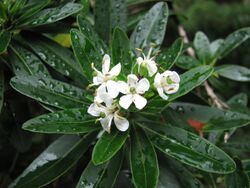Biology:Escallonia bifida
| Escallonia bifida | |
|---|---|

| |
| Scientific classification | |
| Kingdom: | Plantae |
| Clade: | Tracheophytes |
| Clade: | Angiosperms |
| Clade: | Eudicots |
| Clade: | Asterids |
| Order: | Escalloniales |
| Family: | Escalloniaceae |
| Genus: | Escallonia |
| Species: | E. bifida
|
| Binomial name | |
| Escallonia bifida Link & Otto[1]
| |
| Synonyms | |
|
Escallonia floribunda var. montevidensis Cham. & Schltdl. | |
Escallonia bifida, the cloven gum box, is an evergreen shrub or small tree in the family Escalloniaceae. It is native to Brazil and Uruguay.[2]
It can grow up to 4 m (13 ft) high and 2.5 m (8.2 ft) broad, and has dark green shiny leaves which are 2 to 7 cm long and 0.8 to 2 cm wide. The pure white flowers, initially tubular but then spreading, appear in summer.[2]
It is sparingly naturalised in New South Wales in Australia.[2] It is found in cultivation in mild coastal regions of the UK (hardy down to −5 °C (23 °F), where its dense habit makes it suitable for tall hedging. In colder areas it requires the protection of a wall. It has gained the Royal Horticultural Society’s Award of Garden Merit.[3][4]
The Latin specific epithet bifida means “cleft in two”.[5]
References
- ↑ "Escallonia bifida Link & Otto". Australian Plant Name Index (APNI), IBIS database. Centre for Plant Biodiversity Research, Australian Government. http://www.anbg.gov.au/cgi-bin/apni?taxon_id=63214.
- ↑ 2.0 2.1 2.2 "New South Wales Flora Online: Escallonia bifida". Royal Botanic Gardens & Domain Trust, Sydney, Australia. http://plantnet.rbgsyd.nsw.gov.au/cgi-bin/NSWfl.pl?page=nswfl&lvl=sp&name=Escallonia~bifida.
- ↑ "RHS Plantfinder - Escallonia bifida". https://www.rhs.org.uk/Plants/44649/i-Escallonia-bifida-i/Details.
- ↑ "AGM Plants - Ornamental". Royal Horticultural Society. July 2017. p. 37. https://www.rhs.org.uk/plants/pdfs/agm-lists/agm-ornamentals.pdf.
- ↑ Harrison, Lorraine (2012). RHS Latin for Gardeners. United Kingdom: Mitchell Beazley. ISBN 978-1845337315.
Wikidata ☰ Q16981770 entry
 |

